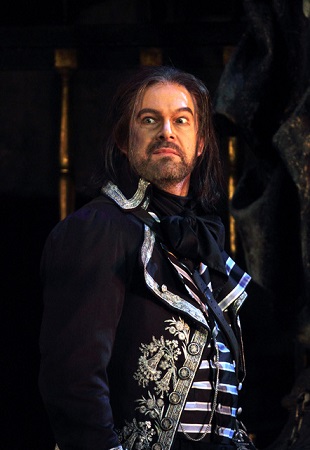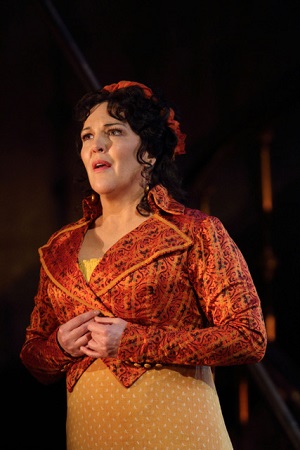Recently in Reviews
English Touring Opera are delighted to announce a season of lyric monodramas to tour nationally from October to December. The season features music for solo singer and piano by Argento, Britten, Tippett and Shostakovich with a bold and inventive approach to making opera during social distancing.
This tenth of ten Live from London concerts was in fact a recorded live performance from California. It was no less enjoyable for that, and it was also uplifting to learn that this wasn’t in fact the ‘last’ LfL event that we will be able to enjoy, courtesy of VOCES8 and their fellow vocal ensembles (more below …).
Ever since Wigmore Hall announced their superb series of autumn concerts, all streamed live and available free of charge, I’d been looking forward to this song recital by Ian Bostridge and Imogen Cooper.
The Sixteen continues its exploration of Henry Purcell’s Welcome Songs for Charles II. As with Robert King’s pioneering Purcell series begun over thirty years ago for Hyperion, Harry Christophers is recording two Welcome Songs per disc.
Although Stile Antico’s programme article for their Live from London recital introduced their selection from the many treasures of the English Renaissance in the context of the theological debates and upheavals of the Tudor and Elizabethan years, their performance was more evocative of private chamber music than of public liturgy.
In February this year, Albanian soprano Ermonela Jaho made a highly lauded debut recital at Wigmore Hall - a concert which both celebrated Opera Rara’s 50th anniversary and honoured the career of the Italian soprano Rosina Storchio (1872-1945), the star of verismo who created the title roles in Leoncavallo’s La bohème and Zazà, Mascagni’s Lodoletta and Puccini’s Madama Butterfly.
Evidently, face masks don’t stifle appreciative “Bravo!”s. And, reducing audience numbers doesn’t lower the volume of such acclamations. For, the audience at Wigmore Hall gave soprano Elizabeth Llewellyn and pianist Simon Lepper a greatly deserved warm reception and hearty response following this lunchtime recital of late-Romantic song.
Collapsology. Or, perhaps we should use the French word ‘Collapsologie’ because this is a transdisciplinary idea pretty much advocated by a series of French theorists - and apparently, mostly French theorists. It in essence focuses on the imminent collapse of modern society and all its layers - a series of escalating crises on a global scale: environmental, economic, geopolitical, governmental; the list is extensive.
For this week’s Live from London vocal recital we moved from the home of VOCES8, St Anne and St Agnes in the City of London, to Kings Place, where The Sixteen - who have been associate artists at the venue for some time - presented a programme of music and words bound together by the theme of ‘reflection’.
'Such is your divine Disposation that both you excellently understand, and royally entertaine the Exercise of Musicke.’
Amongst an avalanche of new Mahler recordings appearing at the moment (Das Lied von der Erde seems to be the most favoured, with three) this 1991 Mahler Second from the 2nd Kassel MahlerFest is one of the more interesting releases.
‘And there was war in heaven: Michael and his angels fought against the dragon; and the dragon fought and his angels, And prevailed not; neither was their place found any more in heaven … that old serpent … Satan, which deceiveth the whole world: he was cast out into the earth, and his angels were cast out with him.’
If there is one myth, it seems believed by some people today, that probably needs shattering it is that post-war recordings or performances of Wagner operas were always of exceptional quality. This 1949 Hamburg Tristan und Isolde is one of those recordings - though quite who is to blame for its many problems takes quite some unearthing.
There was never any doubt that the fifth of the twelve Met Stars Live in Concert broadcasts was going to be a palpably intense and vivid event, as well as a musically stunning and theatrically enervating experience.
‘Love’ was the theme for this Live from London performance by Apollo5. Given the complexity and diversity of that human emotion, and Apollo5’s reputation for versatility and diverse repertoire, ranging from Renaissance choral music to jazz, from contemporary classical works to popular song, it was no surprise that their programme spanned 500 years and several musical styles.
The Academy of St Martin in the Fields have titled their autumn series of eight concerts - which are taking place at 5pm and 7.30pm on two Saturdays each month at their home venue in Trafalgar Square, and being filmed for streaming the following Thursday - ‘re:connect’.
The London Symphony Orchestra opened their Autumn 2020 season with a homage to Oliver Knussen, who died at the age of 66 in July 2018. The programme traced a national musical lineage through the twentieth century, from Britten to Knussen, on to Mark-Anthony Turnage, and entwining the LSO and Rattle too.
With the Live from London digital vocal festival entering the second half of the series, the festival’s host, VOCES8, returned to their home at St Annes and St Agnes in the City of London to present a sequence of ‘Choral Dances’ - vocal music inspired by dance, embracing diverse genres from the Renaissance madrigal to swing jazz.
Just a few unison string wriggles from the opening of Mozart’s overture to Le nozze di Figaro are enough to make any opera-lover perch on the edge of their seat, in excited anticipation of the drama in music to come, so there could be no other curtain-raiser for this Gala Concert at the Royal Opera House, the latest instalment from ‘their House’ to ‘our houses’.
"Before the ending of the day, creator of all things, we pray that, with your accustomed mercy, you may watch over us."
Reviews

16 Jan 2018
Puccini’s Tosca at the Royal Opera House
Now on its ninth revival, Jonathan Kent’s classic Tosca for Covent Garden is a study in art, beauty and passion but also darkness, power and empire. Part of the production’s lasting greatness, and contemporary value, is that it looks inwards towards the malignancy of a great empire (in this case a Napoleonic one), whilst looking outward towards a city-nation in terminal decline (Rome).
Century old power struggles between artists and lovers and authoritarian
rulers may be set in Jonathan Kent’s 1800, but the austerity of food riots,
street-brawls that end in bloody knifings, mass imprisonments, deportations
and executions resonate century’s later in different times and different
places.
The very static nature of the production seems to reiterate this inaction,
just as Paul Brown’s designs distance almost everyone except the main
actors from everyone else. In Act One, for example, the celebrants of the
Te Deum are not just nearer God, in the sense they are above everyone else,
they are also behind gilded bars. This is religion as an exclusive and very
pious celebration. When we come to Act Two, and Scarpia’s opulent quarters,
deliberately angled to magnify their size, and a statue that recalls the
Commendatore in Don Giovanni, a bookcase masks a door that leads
downwards towards torture chambers. The idea we are moving from heaven
towards hell couldn’t be more transparent.
It’s arguable this Tosca is just too darkly lit at times. It feels
oppressive. The tenebrous shroud that sits like decades of peat and dust is
undeniably impressive at times, especially when it highlights shadows.
Scarpia descending the staircase before the Te Deum in Act one is one such
example - giving a fleeting glimpse of a 1930s black and white swashbuckler
movie. There are hints of sepia and chrome. But in Act Two, especially at
the very opening of it, it can make both Floria and Scarpia almost
invisible as if they have become absorbed into the scenery like part of a
Roman frieze. One doesn’t really notice the candlelight gradually becoming
extinguished as Act Two reaches its glorious conclusion - and by the time
Floria places two candles besides Scarpia’s lifeless body there isn’t
enough light to really emphasise the curdling red of his murder. It’s all
rather pallid.
 Adrianne Pieczonka (Floria Tosca). Photo credit: Catherine Ashmore.
Adrianne Pieczonka (Floria Tosca). Photo credit: Catherine Ashmore.
If the staging and production itself of this Tosca are memorable,
the casting of it has some acute problems. Adrianne Pieczonka is absolutely
mesmerising in the title role. Here we have a soprano who has the lyrical
qualities of someone like Mirella Freni at her very best, but with the
dramatic heft to make the voice ride effortlessly over the orchestra, which
Freni couldn’t always do live. The power and ease with which Ms Pieczonka
was able to sustain her high register without the trace of a wobble was
always notable, though I found her Act Two strangely underwhelming. A
tendency to clip her higher notes at the point rather than ride them
generally made some of her singing in Act Two seem rushed, which was
unfortunate, notably in her extended duets with Scarpia. This became all
the more obvious when she gave such a glorious performance of “Vissi
d’arte’. The tenor, Joseph Calleja, as Cavaradossi, also struggled at
times. His voice sounded small and often opaque. Having said that, he is
unquestionably a masterful interpreter of what he actually sings and no
singer on the evening came closer to getting as musically close to what
Puccini demanded of his singer. One particular line just leaps out from the
entire evening - “le belle forme disciogliea dai veli!”… the final
pianissimo was one of the most breath-taking I have heard any tenor sing
live in an opera house. Most disappointing of all was Gerald Finley’s Baron
Scarpia. Here we have a singer who looks the part, but that is as far as it
goes. With his barely concealed malevolence, he cuts a dashing figure, but
the voice is hugely underpowered for the role. Aled Hall, as Spoletta, and
Simon Shibambu as Angelotti, were both fine.
The Israeli conductor, Dan Ettinger, was rarely inspired in a score that is
dripping with inspiration. Although the playing by the orchestra was
perfectly fine, nor was it lush enough to capture the opulence that
breathes from every pore of this opera. There was some very notable horn
playing, though largely this rather felt like the ninth revival for much of
the orchestra as well. This is a Tosca that looks impressive, but
feels like it needs a reboot.
From 18th January until 3rd March 2018.
Performance 7th February relayed in cinemas live around the
world.
Marc Bridle
Puccini: Tosca
Adrianne Pieczonka (Tosca), Joseph Caleja (Cavaradossi), Gerald Fiinley
(Baron Scarpia), Aled Hall (Spoletto), Simon Shibambu (Angelotti), Jeremy
White (Sacristan) Jihoon Kim (Sciarrone). Dan Ettinger (conductor),
Jonathan Kent (director), Paul Brown (designer), Mark Henderson (lighting),
Orchestra and Chorus of Royal Opera House Covent Garden
Royal Opera House, Covent Garden, London; 15th January 2018.

